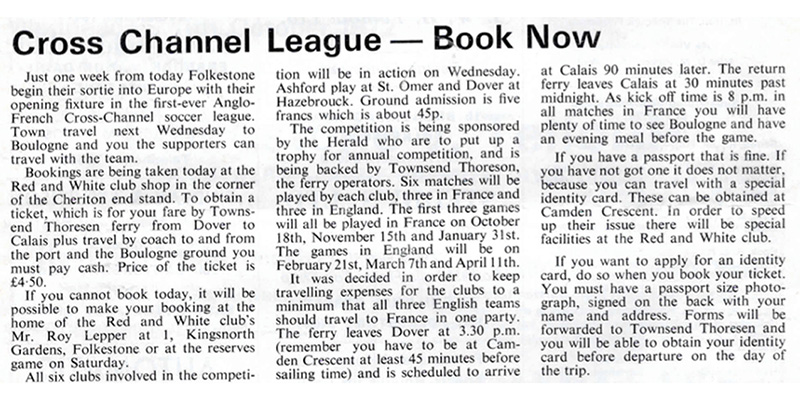
A brief taste of European football for Kent’s non-League clubs was scuppered by logistics in the early 1970s
March 9 ~ As the pandemic has proved, there’s much more than the weather that can disrupt the football schedules, especially when it comes to matches being played overseas. Fifty years ago a European club competition was abandoned through difficulties caused not only by industrial unrest and border chaos, but also through the ambition of its undertaking. Because – it would not be unfair to say – the clubs that participated were not Europe’s elite.
The 1972-73 Cross-Channel League was an attempt to bring some continental excitement to non-League football in Kent. Three English teams – Ashford Town, Folkestone and Dover – played French teams similarly close to their coast – Boulogne, Hazebrouck and Saint-Omer. Six matches were to be played by each club, three in England and three in France.
The idea was an attempt to address the issues that had beset earlier competitions such as the 1958-59 Channel Cup. This was a knockout tournament created by the French newspaper Voix du Nord, whose insistence on one club from each country reaching the final had led to an unsustainable number of play-off games in England, which the FA required to be completed before their own FA Cup final day.
Envisaged as an annual competition, the 1972-73 iteration was backed by the ferry operator Townsend Thoresen. With fixtures taking place concurrently, each matchday would see both players and fans of one nation’s three representative teams make a return journey across the Channel, a welcome boost to the company’s business. Combined coach and ferry travel cost £4.50 and the French sides charged an average of five francs for entry, or about 45 pence. So for just under £5 (around £60 today) it was possible to follow one’s club on a European adventure. And you didn’t even need a passport – “special identity cards” could be obtained from Townsend Thoresen on the day of travel.
The enterprise got off to a promising start in France on October 18, 1972, with Folkestone even receiving a champagne reception from their hosts Boulogne, then riding high in the French second division, after a less effervescent 0-0 draw.
Problems began when it was the turn of the French teams to visit Kent. The power shortages that would later lead to the three-day week resulted in the postponement of the first fixtures. But midweek games also had to be played in accordance with the ferry timetables, which meant a 6.15pm kick-off that had a severe impact on crowds.
Boulogne’s trip to Folkestone was first rescheduled owing to seven first-team players being out injured, but then postponed twice; three of their players were Polish and, try as they might, were unable to get visas to visit the UK. Unfortunately, the last-minute nature of these postponements often led to Folkestone fans arriving at a padlocked ground.
It is regrettable that the competition was devoid of derby games (Dover’s Boxing Day 1972 visit to Folkestone in the Southern League Premier Division drew an official crowd of 2,168) but further fixtures were the last thing any team sought.
The fortunes of many of the clubs in 1973 made fixture congestion unpalatable. Boulogne and Dover were pushing for promotion from their leagues (both unsuccessfully), while Folkestone were attempting to avoid the drop (they succeeded). The Cross-Channel League would never be completed.
David Crook made some of the first of his over 300 appearances for Folkestone in the competition, and considers its lack of conclusion a shame: “The French teams played to a high standard.” Playing foreign opposition was different, exciting and broadened footballing horizons, though Ashford Town’s Roy Hodgson, who played in the tournament, took this further than most by subsequently managing in eight different countries. Despite the logistical difficulties and expense of overseas travel, Crook maintains that it was still easier for Folkestone and Dover to play in France than make some of their midweek away games that season, which included trips to Burton, Telford, Worcester and Yeovil.
With precious few League clubs and proximity to London ensuring a great deal of football support heads to the capital, non-League football in Kent can sometimes be viewed as a backwater, albeit undoubtedly rich in history. But perhaps a time will come for them to innovate once again and attempt European competition. Clubs such as Guernsey and FC Isle of Man prove that, even at a lower level, geographic location can be overcome – and the Channel is only 21 miles across. Ben Cottam
This article first appeared in WSC 418, March 2022. Subscribers get free access to the complete WSC digital archive – you can find out more here.
Want to see your writing published in WSC? Take a look at our pitching guide and get in touch
